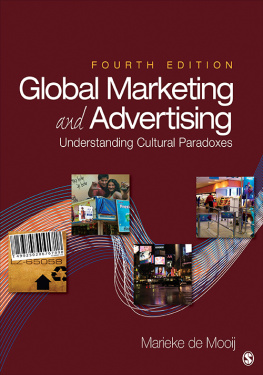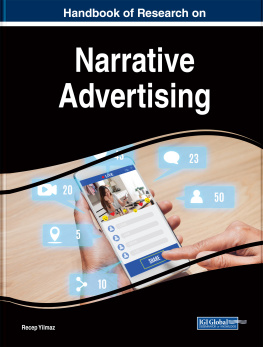Mooij - Global marketing and advertising: understanding cultural paradoxes
Here you can read online Mooij - Global marketing and advertising: understanding cultural paradoxes full text of the book (entire story) in english for free. Download pdf and epub, get meaning, cover and reviews about this ebook. year: 2013, publisher: SAGE Publications, genre: Business. Description of the work, (preface) as well as reviews are available. Best literature library LitArk.com created for fans of good reading and offers a wide selection of genres:
Romance novel
Science fiction
Adventure
Detective
Science
History
Home and family
Prose
Art
Politics
Computer
Non-fiction
Religion
Business
Children
Humor
Choose a favorite category and find really read worthwhile books. Enjoy immersion in the world of imagination, feel the emotions of the characters or learn something new for yourself, make an fascinating discovery.
- Book:Global marketing and advertising: understanding cultural paradoxes
- Author:
- Publisher:SAGE Publications
- Genre:
- Year:2013
- Rating:5 / 5
- Favourites:Add to favourites
- Your mark:
- 100
- 1
- 2
- 3
- 4
- 5
Global marketing and advertising: understanding cultural paradoxes: summary, description and annotation
We offer to read an annotation, description, summary or preface (depends on what the author of the book "Global marketing and advertising: understanding cultural paradoxes" wrote himself). If you haven't found the necessary information about the book — write in the comments, we will try to find it.
Mooij: author's other books
Who wrote Global marketing and advertising: understanding cultural paradoxes? Find out the surname, the name of the author of the book and a list of all author's works by series.
Global marketing and advertising: understanding cultural paradoxes — read online for free the complete book (whole text) full work
Below is the text of the book, divided by pages. System saving the place of the last page read, allows you to conveniently read the book "Global marketing and advertising: understanding cultural paradoxes" online for free, without having to search again every time where you left off. Put a bookmark, and you can go to the page where you finished reading at any time.
Font size:
Interval:
Bookmark:



Copyright 2014 by SAGE Publications, Inc.
All rights reserved. No part of this book may be reproduced or utilized in any form or by any means, electronic or mechanical, including photocopying, recording, or by any information storage and retrieval system, without permission in writing from the publisher.
Printed in the United States of America
Library of Congress Cataloging-in-Publication Data
Mooij, Marieke K. de, 1943
Global marketing and advertising : understanding cultural paradoxes / Marieke de Mooij. Fourth Edition.
pages cm
Includes bibliographical references and index.
ISBN 978-1-4522-5717-4
1. Target marketingCross-cultural studies.
2. AdvertisingCross-cultural studies. 3. Consumer behaviorCross-cultural studies. I. Title.
HF5415.127.M66 2013
658.802dc23 2013016276
This book is printed on acid-free paper.
13 14 15 16 17 10 9 8 7 6 5 4 3 2 1

FOR INFORMATION:
SAGE Publications, Inc.
2455 Teller Road
Thousand Oaks, California 91320
E-mail:
SAGE Publications Ltd.
1 Olivers Yard
55 City Road
London EC1Y 1SP
United Kingdom
SAGE Publications India Pvt. Ltd.
B 1/I 1 Mohan Cooperative Industrial Area
Mathura Road, New Delhi 110 044
India
SAGE Publications Asia-Pacific Pte. Ltd.
3 Church Street
#10-04 Samsung Hub
Singapore 049483
Acquisitions Editor: Patricia Quinlin
Editorial Assistant: Katie Guarino
Assistant Editor: Megan Koraly
Production Editor: Jane Haenel
Copy Editor: Patrice Sutton
Typesetter: C&M Digitals (P) Ltd.
Proofreader: Rae-Ann Goodwin
Indexer: Terri Corry
Cover Designer: Bryan Fishman
Marketing Manager: Liz Thornton
Brief Contents
Geert Hofstede
Detailed Contents
Geert Hofstede
Foreword
A naive set of assumptions, quite common in both business and academia up till the present day, is that peoples rationality as a producer differs from their rationality as a consumer. Producers rationality is supposed to mean maximizing income; consumers rationality is something for marketing people to discover.
Fundamentally, there is not such a thing as a universal rationalitya discovery which economists applying rational choice models have yet to make. What is rational or irrational to a person depends on that persons value system, which in turn is part of the culture this person has acquired early in her or his lifetime. What people around the world value varies enormously: It includes poverty next to maximizing income, togetherness next to individuality, cooperation next to competition, modesty next to assertiveness, saving next to spending, chastity next to sexual fulfilment, self-effacement next to self-actualization. Downsizing personnel in order to maximize a companys profits may be rational in one societysay, the United Statesbut not in anothersay, Japanin which employees commitment is the companys main capital.
Marketing and advertising are basically about consumers, not about producers. Marketing and advertising theories based on producers logic but missing consumers logic are useless. Market research agencies try to bridge the gap between the two kinds of logic, and their excellence depends on their ability to make the producer think in consumers terms. Even within one country, this is not easy; it becomes extremely difficult if consumers are children of other countries cultures.
In the broader area of management, ethnocentric approaches over the past thirty years have gradually lost support, if only because they proved ineffective, even fatal. International or comparative management has become a recognized subdiscipline of management education; no current management text- or handbook can do without it, even if the treatment of the subject often betrays hidden ethnocentrism.
It is a paradox that in the areas of marketing and advertising theories, ethnocentrism has survived longer than in (general) management. A paradox, because if there is one aspect of the business that is culture-dependent, it is consumer behavior. As Marieke de Mooij argues, there may be global products, but there are no global people. The success of a business in the end depends on how well its products reach customers whose behavior is affected by values that may vary in unexpected ways from those of the business managers.
Marieke de Mooij is a world pioneer in the field of culture and marketing. She brought along a thorough experience base in advertising, extensive teaching and consulting experience in different parts of the world, and the ability to empathize with people in other countries. The evolution of this bookfour editions since 1998, each new version thoroughly re-worked, reflects her leadership in the field. The book is now adopted at universities worldwide, equally in the various world regions.
In the first edition, she linked her insights into marketing and advertising practice in different parts of the world to state-of-the-art outcomes of culture research. The second, 2005 edition, integrated new information about differences in consumer behavior and their development over time. The third, 2010 edition, kept up with the dynamics of electronic media including the cultural role of websites and with the cultural component in product and packaging design. This fourth edition, with more world regions covered and based on more comparative data than ever, confirms the stability of value differences over time. It shows how the usage of modern media reflects basic differences in human communication. Age-old philosophies like Buddhism and Hinduism are still at the root of Eastern communication, just like Western communication has built its theories on Aristotles Rhetoric.
This foreword is written at a time of ongoing global business crisis, in which cultural factors are playing a crucial role. Success in cross-cultural marketing asks for a new style of marketing leadership. Not, at least as the stereotype goes, oriented to quick judgment and action according to trusted principles. The successful cross-cultural marketing manager is more reflective, open to alternatives, with a broad interest in other societies and what makes people in them tick. This book is for those aspiring to be or become that kind of person.
Geert Hofstede
Velp, The Netherlands, March 2013
Preface to the Fourth Edition
I nterest in understanding cultures influence on marketing and advertising is growing worldwide. New digital developments in the global marketplace also reinforce the need to understand how communication works across cultures, as the digital media are hybrid forms of interpersonal and mass communication. This is an important addition to the text.
Next to updates throughout the book, other changes are a result of comments from users. I changed on strategy.
now includes sections on human communication across cultures and explains how different age-old philosophies of each world region are at the basis of human communication. I moved Public Relations, product- and packaging design as well as retail to the final chapter on strategy. To that chapter, I added a summary of market entry strategies and the marketing mix. Some users would expect this at the beginning of the book, however, as this book focuses on the influence of culture, and culture must be explained first, I deal with most strategic aspects in the final chapter.
Next pageFont size:
Interval:
Bookmark:
Similar books «Global marketing and advertising: understanding cultural paradoxes»
Look at similar books to Global marketing and advertising: understanding cultural paradoxes. We have selected literature similar in name and meaning in the hope of providing readers with more options to find new, interesting, not yet read works.
Discussion, reviews of the book Global marketing and advertising: understanding cultural paradoxes and just readers' own opinions. Leave your comments, write what you think about the work, its meaning or the main characters. Specify what exactly you liked and what you didn't like, and why you think so.










